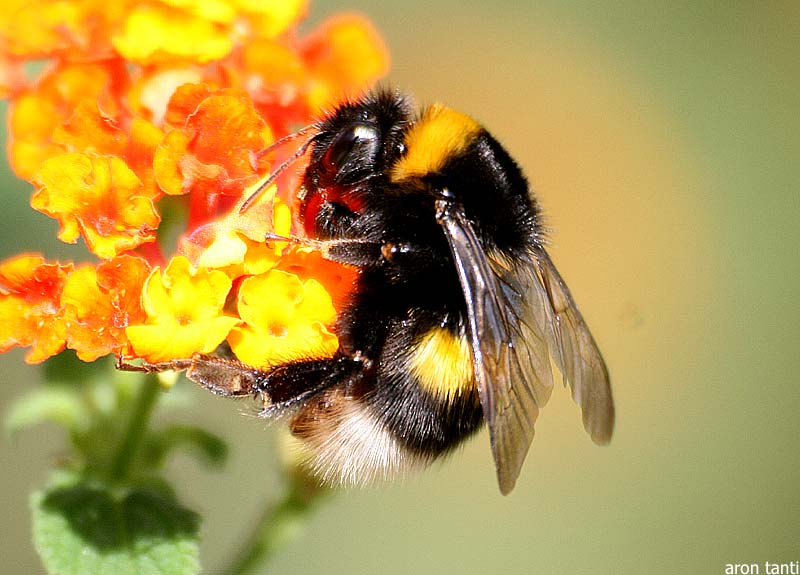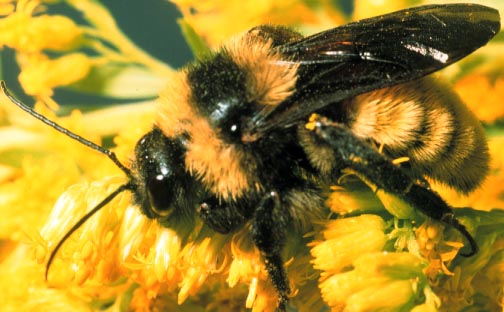Gardening
Related: About this forumAdvice needed on huge bee and ant invasions in my yard.
Yesterday when my son and his girlfriend Kristina were here, they were helping me to tame my 1/3 acre yard. For the last three years, family obligations allowed me no time to work in our yard, and the many tall Norwegian pines and holly trees and about 35 bushes had become seriously overgrown, bad for the plants and the look of things. Weeds are endemic everywhere! So my son was helping out. My son is 7' tall, and one way he was helping was by pruning some tree branches that I couldn't reach. When we got to the last tree, a 3-story holly, we discovered a surprise that was startling and a little frightening.
My son snipped just one branch on that tree, and suddenly, about 20 very large yellow and black bees were buzzing and swarming all over the tree, coming from somewhere inside its deep and tangled branches. We moved quickly away. I think that was around 3pm. Throughout the afternoon and evening, as I worked in the yard, I passed by the tree many times. Every time I passed, the entire tree was buzzing, quite loudly, even at 8 pm. It was so loud, I considered trying to record it on my cell phone, but just then the neighbor started up his tractor mower so I didn't bother. I was quite surprised, because I had done some serious pruning and hacking around that same tree 2-3 days before, and even on that same tree on the same side of that tree, and saw no signs of what suddenly appeared yesterday. But then again, it was 55 degrees when I was pruning; I was so chilly I was wearing a sweater to do what usually would have resulted in sweat pouring off of me. Perhaps that temperature was so low it kept the bees inactive?
The freaky part was that just the day before, our neighbor Lloyd, 79 years old, told me to watch out because the Africanized bees were now in Pennsylvania. He said he had one in his garage and saw it up close and recognized it. So when I then saw this swarm around the tree, the very next day, I was a bit alarmed. But I just googled and it said there is no discernible difference in appearance except that they are smaller, and yet, Lloyd said he could tell because this bee was really large. There is no info on Africanized bees having entered Pa on the internet that I could find, except a note that the bees could at any time be imported accidentally during travel or shipments of goods.
I have planted quite a few flowers...wanting to attract and nourish the diminishing honeybee population... wanting to get pollination for my vegetables this summer. I don't see any honeybees near my flowers, just an occasional bumble (or carpenter?) bee. But the holly trees (5 of them, the smallest 2 stories high) are blooming now, and are huge and contiguous, and so perhaps that is keeping their attention and keeping them full so they aren't as yet going to my flowers. I wanted to attract honey bees, but never anticipated having a swarm that would make a 3 story tree hum so loudly that you can hear it from quite a few feet away.
I wonder if there is some state agency that I could call and have them check it out? Should I bother doing so? Or maybe Orkin will look? I don't want to jeopardize normal honey bees, but also don't want to end up in the ER! One thing is for sure: that tree isn't getting the trimming it needs........
Originally I was going to warn my neighbor about the tree, which is on the boundary of our properties (though the trunk is on mine). But I'm glad I didn't yet, because this could be just regular honey bees, and he'd likely have them exterminated. I don't want to do that, if it isn't necessary, and if these are regular honeybees...but, how do I tell? Will regular honey bees swarm and make angry noises for hours if you disturb a tree they are in?
We also have been invaded by a massive army of ants on the front lawn. As in, incredibly large. The entire front lawn has little brown ant hills, 2-3 inches in height, every 6 inches or so everywhere, in an area about 40' x 25'. I've never seen anything like that in my life. Ants, yes, but in this massive a quantity? No! Also, I've never seen ant hills that were such a dark brown in color. I think the massive generation of weeds in our lawn in recent years might have contributed to their population increase. When we first moved here, we had a gorgeous lawn full of thick grass, so thick it was very difficult to mow, and the bag had to be emptied often... before you could even go one full length of the lawn. I loved the look and feel of it, but also realized this lawn must have had massive amounts of pesticides that poisoned the water to maintain it that way, something I'm not willing to do to the environment. For the first few years, simply by heavy watering, I was able to keep it like that. Weeds like dry environments, and grass wet, so heavy watering and some pulling kept weeds at bay. I also would hand-pull weeds in many areas, and as I did, I noticed that ants seemed to like to congregate and build their nests near the weeds, (discovered when I sat on the lawn to remove the weeds and suddenly had them all over me). Then I stopped the watering, to save money, and due to lack of time because of family issues, and the weeds started to go crazy. Part of that growth was also because the gas company replaced some lines and dug up a 3' wide by 40' long swath across the property line by the road, and then seeded the area, apparently with 95% weed seed, which then spread across the lawn. I noticed that ants seemed to like to cohabit with weeds. Perhaps the drier soil is easier for them to work' perhaps they eat the weeds/seeds of them. Well, now the whole lawn is a weedy mess, and the numbers of ant hills is just astounding. I still don't want to use pesticides, but perhaps I will have to??? It's one thing to have a small colony and try to cut it back or eliminate it. But this is a 40' x 25' full on invasion.
If anyone has any ideas that are environmentally safe, or a clue as to the possible dangers of the bees or what we should do, I'd be most appreciative!
Thanks!
alfie
(527 posts)Yellow jackets and fire ants are my only enemies of those two groups of critters. When ants get somewhere I don't want them, like my kitchen, I spray the area lightly with orange oil and they leave. I don't see a bunch of dead ones, they just seem to go away. Yellow jackets I just have to to try and avoid. If your bees are honey bees, a beekeeper might be glad to come and get the swarm. The ants may well be helping clean up the debrie from last year's weeds. I used orange oil on my pea trellis when ants were herding aphids on them one year and it did the job without harming the plants.
Don't know if that helps you...hope so.
Sanity Claws
(22,315 posts)Is this orange oil made for furniture? Or is it something else?
Ants are coming into my apartment and I'd like to stop them in an eco friendly way
alfie
(527 posts)Just a light spray seems to work.
ret5hd
(22,080 posts)if so, they are bumble bees and they won't bother you.


csziggy
(34,189 posts)My worst stings ever were from bumble bees that got me four times on one ankle - the entire leg was so swollen I thought the skin would split. Normally bumble bees do not get agitated but my husband and I had been digging post holes within a few feet of their ground nest, not knowing they were there. What with the pounding the entire nest got upset and came boiling out. I was standing closest and they got me twice before I could move, then chased me 200 yards to get me the other two times.
I do agree with you that large yellow and black bees are likely bumble bees and they will nest in holes in trees as well as in the ground and in buildings.
mopinko
(73,227 posts)yellow jackets and honey bees are about the same size and coloring, and often confuse people. yellow jackets are assholes.
i would get them exterminated. they are not good for much.
if they are honey bees, and swarming, they will likely be gone in a couple days. you can look around for a local beekeepers association, and they should know someone who will come and capture them.
csziggy
(34,189 posts)Response to csziggy (Reply #7)
DebJ This message was self-deleted by its author.
DebJ
(7,699 posts)for the house or the trees!
We just got treated for termites and carpenter ants last year ... and our house is mostly brick!
I got a closer look at one today, and the second/back part of the body is solid black, no yellow on it.
Just behind the head on the front segment it is yellow with a black spot.
Oh my.
http://www.doyourownpestcontrol.com/Carpenter_Bee_Identification_Signs.htm
DebJ
(7,699 posts)The good news is that the males do not sting, and the females have to be seriously aggravated to do so.
The bad news is that we have so very many of these bees, I'm afraid they will kill the holly tree, and that would
cost about $1000 to take down, it is so tall (I'm guessing because we had another tree removed 8 years
ago of similar height (long dead before we bought the house, and only a few branches left on it) and
that cost $700.
Also, our wooden frame, 60 year old windows desperately need replacing, but it will be many years before
we can afford to do that, we have so many large windows, and they are an open invitation to the carpenter bees.
Phooey.